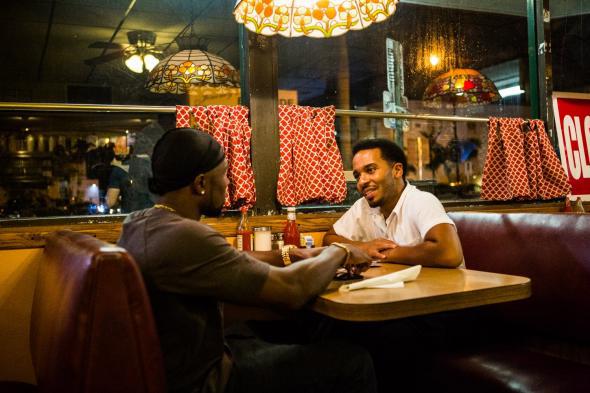About 10 years ago, I swore to myself I would never return to my own country. Visiting some friends in Mexico after many years away, I listened as they repeatedly used the word puto, a gay slur, like it was a disease: No seas puto (don’t be a fag), they said. I was just coming to terms with being gay myself, and suddenly the message seemed clear: To be gay in Mexico, in a culture that values macho masculinity, was anathema. I decided there and then I could never return to Mexico. Being Latino and queer simply couldn’t work—it was one or the other.
It was surprising, then, when I found myself in Mexico City on Sunday night, in a room full of gay friends, watching a very gay film win a very big, gay, shiny award. Envelope snafu aside, Moonlight’s Oscar triumph was an incredibly affirming moment for many in the LGBTQ community, myself included. But not just because it was a film about growing up gay—there have been many highly regarded films about that before (though, to be sure, none have won Best Picture). More important, it was affirming because Moonlight was about growing up gay and black. As Rush Limbaugh so eloquently pointed out on Monday, Hollywood really “went for a twofer.”
We live in a world built on simple oppositions: male or female; gay or straight; black or white. Cultural norms want us to fit easily into these categories because they are easier to understand, and often, oppress. In the world of Moonlight’s protagonist Chiron, being anything other than hypermasculine is downright dangerous: Being black and gay is unthinkable. But the truth is that life is more complicated, more confusing. Moonlight shows us that you can be a drug dealer and a father figure. That a film can be about domestic abuse and also be operatic. And as far as being African American and queer, director Barry Jenkins’ story shows us that it is possible, beautiful even, to be both.
The fact that such a film, which so poetically complicates notions of gender, sexuality, and race, received public recognition is deeply significant. As scriptwriter Tarell Alvin McCraney said in his acceptance speech, Moonlight was made for “black and brown boys and girls and gender-nonconforming … who don’t see themselves … we’re trying show you, you and us … this is for you.” That such a film, made explicitly for young people struggling to reconcile seemingly opposing identities, received the biggest honor in Hollywood is an incredible confirmation of the importance of such stories, a recognition that these identities exist and are worthy of acknowledgment.
The power of such recognition cannot be underestimated. When I left Mexico all those years ago, the country was a very different place. The closest Mexico had to a gay icon was Juan Gabriel, a singer who, although provocative for his flamboyance, never publicly acknowledged his sexuality. Gay marriage was not even dreamed about, there were few openly gay characters on TV, and LGBTQ stories in film were often only hinted at in the darkness. The message, again, was clear: You could be gay in Mexico, you just couldn’t talk about it.
Since then, however, there has been an unbelievable shift. Gay marriage has been recognized in most of the country. Mexico City has become a publicly gay-friendly city, not just for its incredible nightlife and cuisine, but also as a refuge for queer kids from all over the country. Latino celebrities, from singers like Ricky Martin to Christian Chavez, or actors like Sebastian Ligarde, have come out as gay. There are now dozens of queer Mexican TV shows and films, such as Four Moons, a movie which follows four stories of queer Mexican men under the light of the moon.
The effect, for Mexicans like me, has been huge: Like the one encouraged by Moonlight, a conversation has begun about the many different ways of being a man, none of which need to be defined or restricted by race or culture. I feel suddenly equally gay and Mexican. I have found a close group of wildly interesting queer Mexican friends. Even my bro-ish Mexican buddies and my conservative family accept me completely. If my partner and I decide to get married, it will be in Mexico—something I would have never even dreamed about until recently. It was fitting, therefore, to be witnessing Moonlight’s win, a profound moment in global queer culture, in a city that I can now proudly call home, for all my different identities.
There is still, of course, a long way to go. In the U.S., LGBTQ rights are under renewed attack, and no amount of queer films are going to steady the onslaught. In Mexico, too, the anti-marriage-equality movement has gained momentum, and for many queer kids outside of places like Mexico City, life is just as hard as it’s always been. There are far fewer LGBTQ characters on screen than there could be, and celebrities who are all too willing to support gay marriage are much less inclined to publicly acknowledge their own queerness. Still, there is a power in cultural recognition—for queer kids of color, of all different backgrounds, to finally see a mirror on the silver screen, at the awards ceremony, and in government. And at a time when LGBTQ rights face renewed attacks in the U.S., Mexico, and around the world, we need more moonlight than ever.
